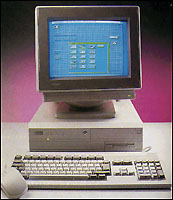
Commodore Amiga 4000

Developer: Commodore International
Launch date: 1992 |
In 1992 Commodore launched the most advanced Amiga yet. The
A4000 used the AGA chipset to allow it to show 256,000 colours on
screen from a palette of 16.8 million, as well as the new Workbench
3 that introduced the concept of among other things, datatypes.
Several variants were available, all fitted with 6MB RAM, 1.76mb
High-Density disk drive and a hard drive as standard. These are
shown below:
| Processor: |
EC030@25Mhz (on motherboard for A4000-CR models)
EC030@25Mhz via Commodore A3630 processor card
040@25Mhz via Commodore A3640 processor card |
| Motherboard Revisions |
Rev A
Rev B (the most common variation)
Rev C
Rev D (A4000-CR motherboard,
processor is soldered to the motherboard but the CPU Fast Slot is
still available)
Rev 2B |
As a replacements for the A3000 & A3000T, the A4000 was a
combination of the A2000 (big box), A3000 (vertical slots
(integrated hard drive controller) and A1200 (AGA chips). As
standard it allows memory expansion for up to 18Mb RAM on the
motherboard. It shipped with either a 25 MHz 68030/68882 or 25 MHz
68040 CPU. The A4000 was never intended for release, but was a
prototype for a system known as the A3000
Plus which was a considerably better machine. The machine was
eventually cancelled and the A4000 drafted for release due to the
low cost of development. Many ex-Commodore engineers, Dave Haynie
being the most notable, have never forgiven this marketing blunder
that replaced a machine that corrected many of the Amigas failings
with one based around an extremely flawed design.
Close-up of the A4000 logo (7.33k) |
A4000 Motherboard Revision 1 (80.2k)
A4000 Rev D (47K) A4000 Rev D - Picture 2 (171K)
Relevant Links
A4000 Tech Specs | Press Release - Commodore announce the A4000
The A4000 blueprints | The A4000TE
BACK
Last Update:8/3/2002
|













